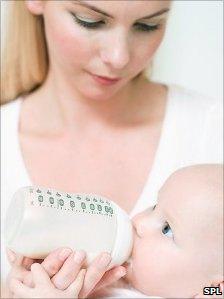Mums who choose bottle over breastfeeding 'demonised'
- Published

The Department of Health advocates breastfeeding as the best choice
"Breast is best" is a message all new mothers receive. But in this week's Scrubbing Up, Dr Ellie Lee, a parenting expert, says government advice should offer more balanced advice about different feeding methods.
How should mothers feed their new babies? The message from the Department of Health is unequivocal. There is a hierarchy. Exclusive breastfeeding (ideally for six months) sits squarely at the top as the way a mother can do what is best for her baby and for her. Bottle-feeding with expressed breastmilk comes next. Bottle feeding with formula milk as an "alternative" comes definitively at the bottom.
Those who support this representation argue it is manifestly "evidence based". It reflects both findings of scientific studies about the health of babies and mothers they say, and very importantly also reflects what is known about mothers' views and experiences.
Mothers, who are aware of the benefits, generally want to breastfeed, it is argued, and the propensity for many to use formula milk to feed their baby especially in the early weeks after birth reflects primarily a lack of information and support for breastfeeding.
Mothers' experiences
But my research and that of colleagues here and abroad paints a far less cut-and-dried picture, especially when it comes to mothers' experiences and what many may want.
The contrast between official interpretations of "the evidence" and those I am more persuaded by comes into focus most clearly in the light of research about mothers' experiences of formula feeding.
There seems to be a far greater range of experiences than may at first appear to be the case.
Some who started out breastfeeding certainly consider they were not given enough or the right sort of help and advice, but those who formula feed raise plenty of other things too.
Dislike of breastfeeding
Recently policy-makers have decided to focus on going back to work as important, but more frequently women talk about "convenience", "dislike of breastfeeding", and "wanting to get back to normal".
It is notable that the government's own large-scale study, the Infant Feeding Survey, detected these aspects of mother's experience.
Yet these experiences, especially "convenience" and "disliking breastfeeding" are not recognised and taken seriously.
They are simply not referred to in most information for mothers about bottle-feeding and why they might consider doing it.
Instead they are often twisted on their heads; so there is plenty of video footage on NHS websites where mothers talk about how convenient breastfeeding is and how much they got out of it once they had mastered the technique.
Sometimes these experiences are even pathologised; so if a mother dislikes breastfeeding some suggest she is "uncomfortable" with her own body, and if she seeks convenience she has the "wrong attitude" toward motherhood.
In this light it is perhaps understandable that those who formula feed often report feeling "got at", stigmatised, or very angry.
One of the saddest aspects of how things are now is the way many mothers who formula feed talk about health professionals and the health service.
Hostility
It is not just researchers like me who have noticed a growing sense of estrangement and even hostility on the part of some mothers to those who provide their care.
The idea of feeling "pressured" into breastfeeding, not offered respect by health professionals, and being made to feel like a "second-class" mother are quite apparent themes in what some have to say.
Additionally there is a palpable sense of divisions between mothers sometimes when it comes to feeding practices - how you feed is more or less overtly taken as a measure of whether you are a "good" mother.
This is surely one of the most unhelpful (if unintended) outcomes of the way this area of parenthood has been addressed.
Finally, there is a significant gap between received wisdom and everyday experience, when it comes to health and infant feeding.
Put simply, the idea that formula fed babies and their mothers are in manifold ways "unhealthy" does not square with how may talk about "real life".
Perhaps the most obvious area of dissonance in this respect emerges with 'bonding'.
Information about breastfeeding is replete with truly beautiful imagery of mothers and their babies, indicating love and communication. But that about bottle-feeding only shows technicalities; it is all images about hygiene, showing bottles, bleach and bottle brushes, but no mothers feeding their babies with love in their eyes.
The message - sometimes overt - is clear; bottle fed babies do not "bond" so well. Yet this fails to speak to what mothers who feed this way feel, and angers many.
Equally, the lists of other health benefits which are said to accrue only when babies are breastfed do not make sense to mothers who formula feed and find, for example, their babies thrive and do not suffer with tummy bugs and ear infections, or who find that mothers who breastfeed do not magically lose their "baby weight".
Unwarranted Fear
This is not to say there is not sound evidence regarding health and breastfeeding, but simply to suggest that overstatement and one-sidedness, verging sometimes on risk-mongering about how formula-fed babies and their mothers allegedly fare, may likely generate unwarranted fear, or disbelief, rather than help genuinely inform.
There is good reason for a greater degree of openness and honesty when it comes to providing women with information about how to feed their babies, and to say policy makers should think again about the hierarchical approach to feeding methods that now dominates official advice.